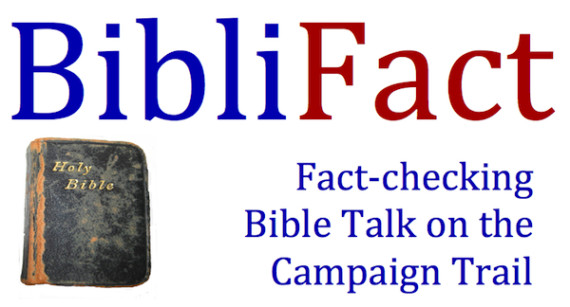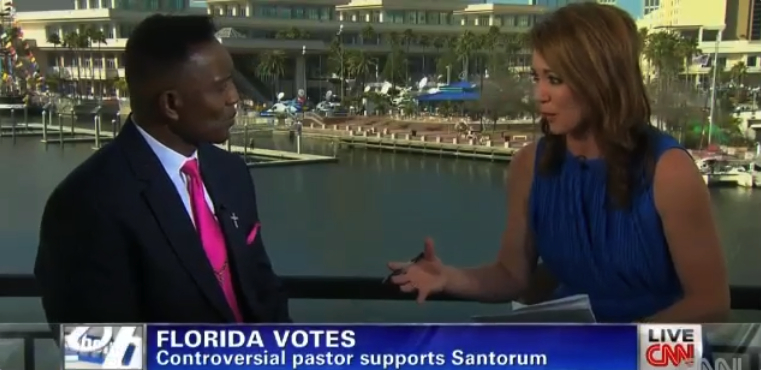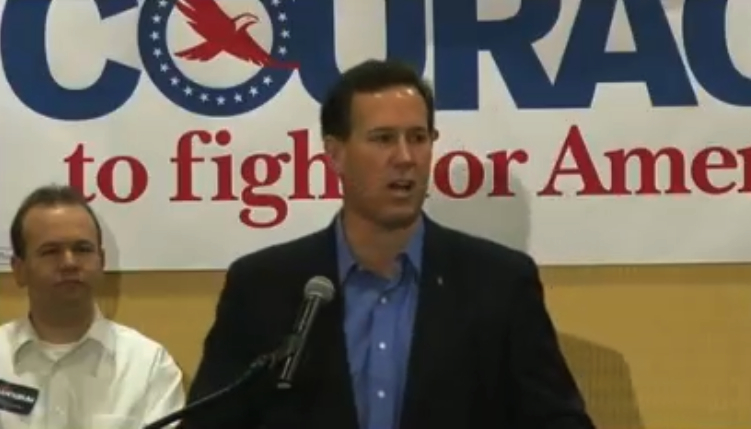
"They welcomed the message very eagerly
and examined the scriptures every day
to see whether these things were so"
--Acts 17:11
As we make our way toward the 2012 elections, many feel tossed to and fro by often contradicting claims about what the Bible says on this or that political issue. Most people just don't know the Bible well enough to say whether these claims are right, wrong, correct, incorrect or a matter of interpretation. On top of that, political Bible talkers on the campaign trail rarely cite chapter and verse, making it tough for us to check them out for ourselves. The Bible is a powerful weapon that has been wielded for good and for ill throughout American history. How can we keep political Biblespeak honest? Inspired by PolitiFact.com, BibliFact roundups aim to do just that.
Roundup #1: Visions, Vomit and Phony Eco-theology

"I've stayed in the race because I think Proverbs is right. It warns that without vision, people will perish."
-- Newt Gingrich, speaking at Judson University, March 15
 Yes, Proverbs 29:18 reads, "Where there is no vision, the people perish." Pretty close, at least in the King James Version, to the Gingrich version. But, whereas he quotes the text to say that he needs to stay in the race because he's the only "conservative visionary," the text itself isn't talking about that kind of leadership. "Vision" (Hebrew chazon, from the verb chazah, "see" or "have vision") refers not to the visionary leadership of a king or other head of state, but rather to the challenging visions of a prophet. Biblical prophets usually stand outside the mainstream, presenting countercultural, even treasonous perspectives on a society's state of affairs. Read Jeremiah. Rulers and prophets rarely get along. In any case, their job descriptions are for the most part mutually exclusive.
Yes, Proverbs 29:18 reads, "Where there is no vision, the people perish." Pretty close, at least in the King James Version, to the Gingrich version. But, whereas he quotes the text to say that he needs to stay in the race because he's the only "conservative visionary," the text itself isn't talking about that kind of leadership. "Vision" (Hebrew chazon, from the verb chazah, "see" or "have vision") refers not to the visionary leadership of a king or other head of state, but rather to the challenging visions of a prophet. Biblical prophets usually stand outside the mainstream, presenting countercultural, even treasonous perspectives on a society's state of affairs. Read Jeremiah. Rulers and prophets rarely get along. In any case, their job descriptions are for the most part mutually exclusive.
Given Gingrich's tenacity, one wonders if anyone in the audience at Judson, a Christian women's college in Alabama, recalled another passage from the same chapter of Proverbs: "He, that being often reproved hardeneth his neck, shall suddenly be destroyed, and that without remedy" (Proverbs 29:1).

"In the Bible, God actually rained down fire and brimstone upon two cities in the Old Testament, Sodom and Gomorrah, basically because of the sin of homosexuality. Now in that particular passage, God called homosexuality an abomination in his sight. When you translate that particular word, 'abomination,' from its original text, which is the Hebrew text, you will find that that particular word means this: 'disgusting.' That's the meaning of the word. It means 'disgusting' and 'very nasty.'"
--Rev. O'Neal Dozier, Florida pastor and honorary co-chair of Rick Santorum's campaign, explaining to CNN's Brooke Baldwin why he said, "homosexuality is so nasty and disgusting that it makes God want to vomit."
 First, the story of Sodom and Gomorrah (Genesis 18:16-19:29) is not about homosexuality, and God's decision to destroy these biblical twin cities is not "because of the sin of homosexuality," basically or otherwise. So what is it? It's not clear. All God says about their fire-and-brimstone worthiness is this: "How great is the outcry against Sodom and Gomorrah and how very grave their sin! I must go down and see whether they have done altogether according to the outcry that has come to me; and if not, I will know" (Genesis 18:20-21). That's it. The best clue to what's so bad about them is in the word "outcry" (Hebrew ze'aqah), which God uses twice in this short declaration. That word is used elsewhere in the Bible to refer to the outcry of victims of injustice -- as when, in Exodus 2:23, the oppressed Hebrew slaves in Egypt "cry out" (verb form of the same word) to God, which leads to their deliverance. That suggests that the sin of Sodom and Gomorrah is enslavement or a similar form of oppression. (No doubt the idea that homosexuality is to blame comes from later in the story, when men from Sodom try to rape two men staying with Lot, who offers his daughters in their place! An indication of how bad it is for visitors and daughters in Sodom, to be sure, but not really about homosexuality.)
First, the story of Sodom and Gomorrah (Genesis 18:16-19:29) is not about homosexuality, and God's decision to destroy these biblical twin cities is not "because of the sin of homosexuality," basically or otherwise. So what is it? It's not clear. All God says about their fire-and-brimstone worthiness is this: "How great is the outcry against Sodom and Gomorrah and how very grave their sin! I must go down and see whether they have done altogether according to the outcry that has come to me; and if not, I will know" (Genesis 18:20-21). That's it. The best clue to what's so bad about them is in the word "outcry" (Hebrew ze'aqah), which God uses twice in this short declaration. That word is used elsewhere in the Bible to refer to the outcry of victims of injustice -- as when, in Exodus 2:23, the oppressed Hebrew slaves in Egypt "cry out" (verb form of the same word) to God, which leads to their deliverance. That suggests that the sin of Sodom and Gomorrah is enslavement or a similar form of oppression. (No doubt the idea that homosexuality is to blame comes from later in the story, when men from Sodom try to rape two men staying with Lot, who offers his daughters in their place! An indication of how bad it is for visitors and daughters in Sodom, to be sure, but not really about homosexuality.)
Second, the word "abomination," a common translation of the Hebrew word to'evah, which does carry a connotation of physical repugnance, is never used in this story, by God or anyone else.
But Reverend Dozier doesn't stop with that false Bible talk. Concerning the alleged socialist agenda of Obama and other Democrats, he states, "There is no place in the Bible, Brooke, where God orders or even mandates for the rich to give their moneys over to the poor." In fact, there are lots of such places. Here are a couple, just for starters, one in which God commands it and one in which Jesus does:
"Since there will never cease to be some in need on the earth, I therefore command you, "Open your hand to the poor and needy neighbor in your land" (Deuteronomy 15:11).
"Jesus, looking at him, loved him and said, 'You lack one thing; go, sell what you own, and give the money to the poor, and you will have treasure in heaven; then come, follow me.' When he heard this, he was shocked and went away grieving, for he had many possessions" (Mark 10:21-22; see also Matthew 19:21-24).

"I was talking about the radical environmentalists. That's why I was talking about energy. This idea that man is here to serve the earth, as opposed to husband its resources and be good stewards of the earth. And I think that is a phony ideal. I don't believe that that's what we're here to do. That man is here to use the resources and use them wisely, to care for the earth, to be a steward of the earth. We're not here to serve the earth."
--Rick Santorum on CBS's Face the Nation, explaining his statement that Obama's environmental policy is "about some phony ideal, some phony theology. Oh not a theology based on the Bible, just a theology."
 In Genesis 2:15, God forms the first human (ha'adam) from the earth (ha'adamah) and then puts him (or it, since there's only one human so far -- sexual differentiation comes later) in the garden to "serve" or "till" and "keep" it. The Hebrew verb often translated as "till" here is 'abad, whose most basic meaning is "serve." That's how it's almost always translated in the Bible. Whether one translates it as "serve" or "till" in this passage, the sense of careful service of the earth is definitely biblical.
In Genesis 2:15, God forms the first human (ha'adam) from the earth (ha'adamah) and then puts him (or it, since there's only one human so far -- sexual differentiation comes later) in the garden to "serve" or "till" and "keep" it. The Hebrew verb often translated as "till" here is 'abad, whose most basic meaning is "serve." That's how it's almost always translated in the Bible. Whether one translates it as "serve" or "till" in this passage, the sense of careful service of the earth is definitely biblical.
The fact is that the Bible readily serves a wide variety of environmental ethics and policies, because different biblical texts offer different ways of understanding creation, life, the earth and the place of humans within it. In presidential politics, there's a general trend among Republicans to emphasize the language of the first creation story in Genesis, in which God tells humans to "be fruitful and multiply, and fill the earth and subdue it; and have dominion over the fish of the sea and over the birds of the air and over every living thing that moves upon the earth" (Genesis 1:28). Here the emphasis is on the earth as bounty, gift and resource for humans to control and use maximally. Democrats also use that kind of biblical language, but tend to lean a little more toward the second creation story in Genesis, which, as we have seen, emphasizes humankind's intimate, mutually dependent relationship with the earth and other living creatures.